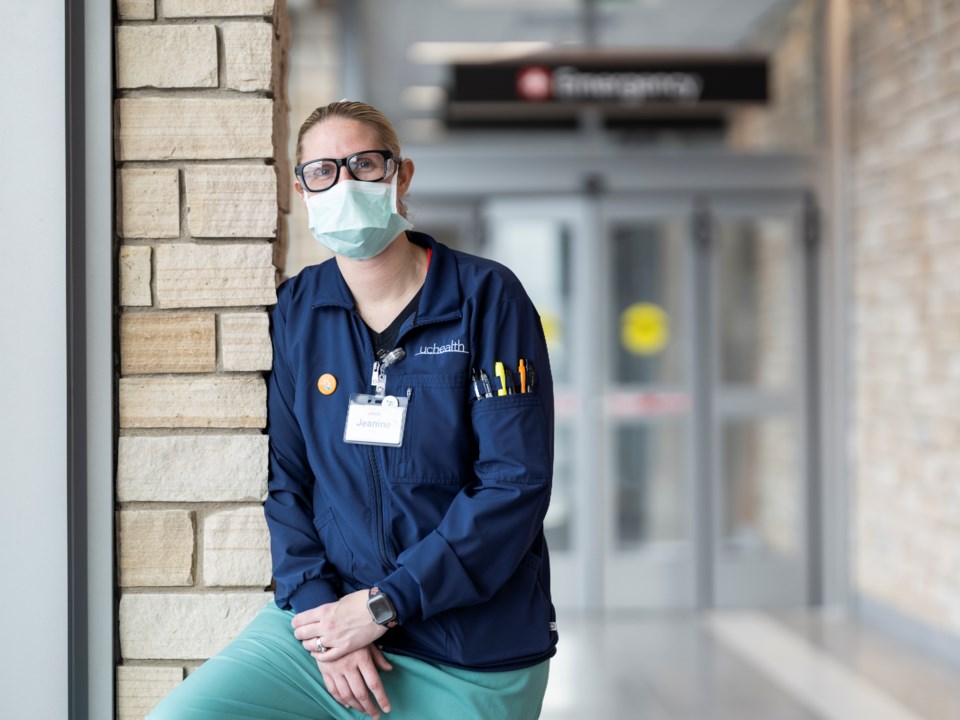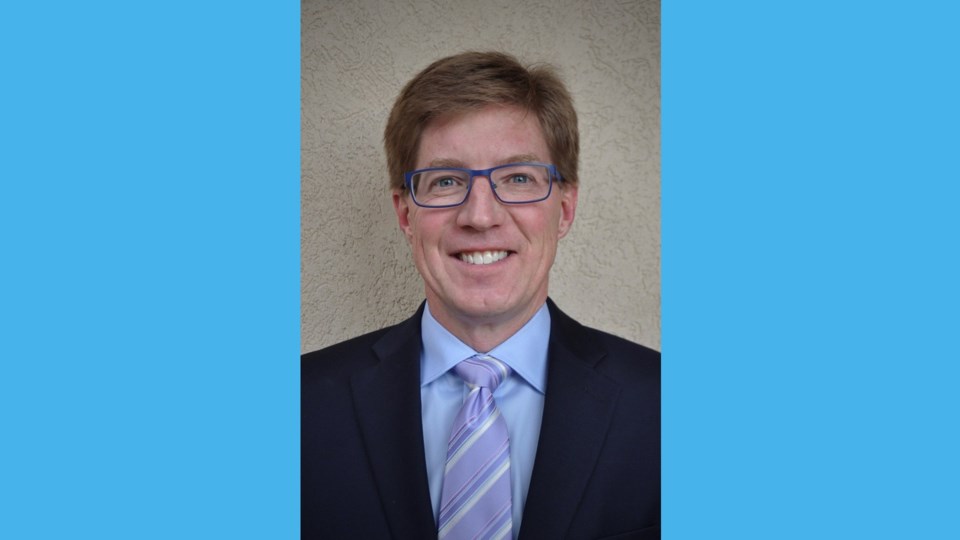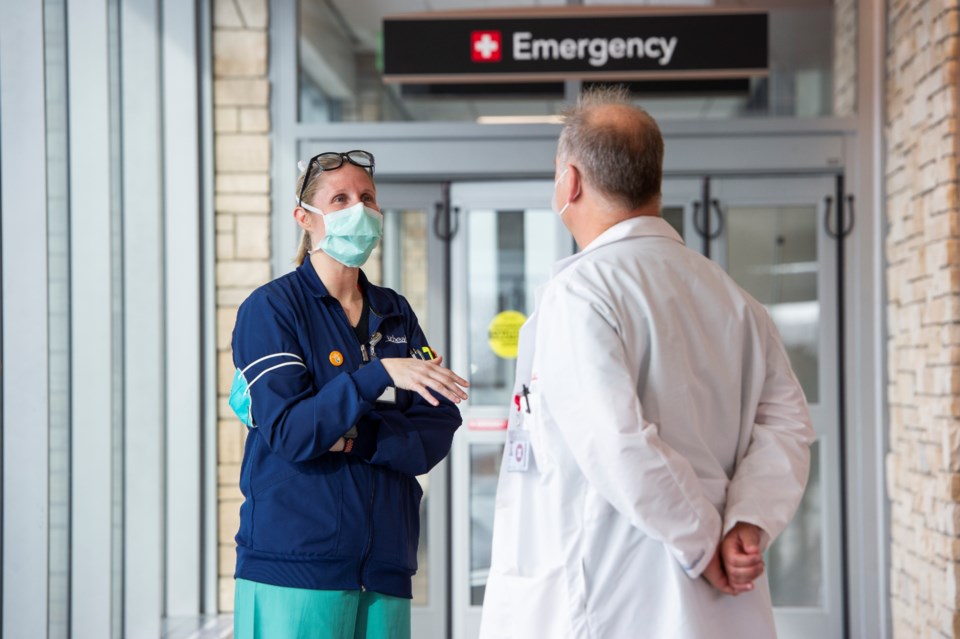About this series:
Today marks one year since Gov. Jared Polis issued a statewide stay-at-home order as COVID cases in Colorado surpassed 1,000. Starting today, The Leader is taking a look at the impacts of the pandemic and the adjustments it prompted in organizations including city government, health care, law enforcement, nonprofits and schools.
Wednesday: City’s COVID-related budget, program cuts didn’t strike bone
Today: Resiliency proved greatest medicine for health care workers on frontlines of pandemic | (Español)
Friday: As COVID hit community hard, Longmont nonprofits rallied to reach those most in need of help
Saturday: Petty crimes and changing procedures: Pandemic has had an impact on law enforcement, criminal justice
Sunday: School during the pandemic: The good, the bad, the ugly, and what the future holds
***
In a year in which fear and uncertainty strained everyone, nowhere was the pressure of the coronavirus pandemic felt more than in health care.
As people retreated to their homes for work, school and nearly everything else, health care workers were thrust into the fight daily while coping with the physical and psychological stress of the virus’ march across the country that as of Wednesday had killed 6,180 Coloradans, according to the state data. In Boulder County, deaths among COVID-positive individuals totaled 250 as of Wednesday, according to public health data.
Nationwide, the death toll stood at 540,503 on Wednesday, according to the Centers for Disease Control and Prevention.
But even as concerns arose statewide about available hospital beds and ventilators, those on the frontlines at Longmont hospitals said teamwork and community support helped buoy their spirits as they worked to provide the best care possible.
“What was tough was the unknown,” Jeanine Snyder, a post-anesthesia care unit nurse at UCHealth’s Longs Peak Hospital, said of the pandemic’s earliest days. “We didn’t know how to properly care for these patients. That’s very frustrating for any health care professional; our lives are dedicated to helping people and we didn’t know how to help.”
Collaboration among hospital staff was key to finding solutions.
“We wouldn’t have survived without the teamwork we had,” said Snyder, who cared for dozens of COVID patients treated at Longs Peak. “... We’ve always been a team but to have everybody within the hospital system really come together, our morale was quite high, even though we were dealing with something very tragic, scary and unknown.”
 Nurse Jeanine Snyder was named UCHealth Longs Peak Hospital's Colorado Superhero, a recognition from the Colorado Hospital Association for the role she played during the pandemic. By Kort Duce / For The Leader
Nurse Jeanine Snyder was named UCHealth Longs Peak Hospital's Colorado Superhero, a recognition from the Colorado Hospital Association for the role she played during the pandemic. By Kort Duce / For The Leader“Importantly, our emergency departments, clinics and virtual visit teams also have cared for thousands more patients and helped them recover without needing to be admitted to a hospital,” she said.
Dr. Antony Pearson, Longmont United Hospital’s chief medical officer, said the amount of innovation staff at all levels came up with in response to the pandemic was “pretty amazing.”
From medical personnel to operations staff to hospital chaplains, they rallied, “coming together to make things better and safer,” he said of efforts at LUH.
A Centura Health spokesperson could not provide information on how many COVID patients have been treated at LUH or systemwide.
All of that helped as staff dealt with their own fears about the virus and as the pandemic ground some areas of the economy to a halt, pushed up unemployment numbers, and pitted city against county in a battle over who should get priority for local hospital beds.
“No egos got in the way,” Snyder said. “... As a medical community we all fell on the same page. It was really special to see. It made it easier to do this job and took off some of that weight.”
Any feared bed shortage never materialized at Longmont hospitals, with both reporting they never had to turn patients away because of lack of space to care for them.
Pressure at work, home
But even as they averted that, other fears lingered among health care workers who, despite their mission to help the sick, had no guarantees they wouldn’t fall ill. And they also were feeling the pressure of not just being health care providers but support systems for patients and families, as loved ones weren’t allowed to visit.
“We had to take on the burden of being this support system as well as medical provider. It was definitely an added pressure to help these patients through this thing they were going through and also just being susceptible to catching something and dying from it,” Snyder said.
Pearson saw those same fears and pressures at Centura Health’s LUH, praising staff for their “willingness to potentially risk their own lives to take care of somebody who is sick.”
Care, he said, reaches a “totally different level when you have to have hazmat gear on head to toe and still show up for work and care for those people in whatever way you can.”
 Dr. Antony Pearson, Longmont United Hospital’s chief medical officer, said the amount of innovation staff at all levels came up with in response to the coronavirus pandemic was “pretty amazing.” Courtesy photo
Dr. Antony Pearson, Longmont United Hospital’s chief medical officer, said the amount of innovation staff at all levels came up with in response to the coronavirus pandemic was “pretty amazing.” Courtesy photo“I thought this is my chance to make a huge difference,” said Snyder, who talked it over with her wife. That discussion came around to what it would mean if she stayed and worked for the community she calls home.
“That meant more to me than making money or going to New York and being one of the nurses portrayed as a hero. Every nurse is a hero, in my opinion,” said Snyder, who was named a UCHealth Longs Peak Hospital's Colorado Superhero, a recognition from the Colorado Hospital Association for the role she played during the pandemic.
“To me it was more about being a good resource in my community. These are the people I see in the world every day. If my wife or a family member got sick, I wouldn’t be here to take care of them.”
Love and support
Snyder said she treated every single person in the intensive care unit like they were family. That feeling of family permeated the hospital and extended way beyond its walls, too.
“The community really poured out its heart and soul and supported us nurses,” said Snyder, who is now pursuing her doctorate to become a nurse practitioner.
“Every day we had food delivered. Everybody knows nurses love food. I could have probably had six lunches a day based on the amount of food that was donated to us. There was a family that came and prayed outside the hospital every day,” she said, adding those prayers were not just for that family’s loved ones, but everyone in and working at the hospital. “I loved that. It spoke volumes to me.”
Her father-in-law also organized a car cruise around Longs Peak, with the parade of classic vehicles honking and waving in support of all the work being done inside.
Such actions made her and other staff realize how much the community cared about what they were doing “and we were really appreciative of that,” she said.
Gestures like providing meals were a big boost to staff at LUH, too, particularly for nurses Pearson said.
While facing down their fears about going to work every day, staff members also were coping with the added stress the pandemic added to their personal lives, including their children learning virtually instead of at school.
“There’s a huge burden related to that separate from the fact that none of us know how to teach school,” he said, adding that just having meals delivered to the hospital and occasionally to their homes meant nurses had one less thing — making lunch — to worry about.
Hospital staff also rallied around each other, setting up tutoring sessions and playdates.
Other stress relief efforts at LUH included free massages for staff, chances to talk with hospital chaplains just to vent, and counseling through the hospital’s employee assistance program. While he said he found his greatest relief from going hard and sweating it out on his Peloton, Pearson said the options allowed staff to choose what worked best in their circumstances.
“It was a matter of what was right for them, whether that is (talking to) a chaplain, whether that is a psychologist through the employee assistance program,” he said, adding that sometimes just talking with coworkers provided the best therapy.
He called the dedication staff members had to one another “absolutely incredible.”
“Their dedication to each other is extraordinary and you can feel it. … Their dedication to do their job at all levels brings tears to my eyes,” he said.
Vaccines lift spirits
Now, with Gov. Jared Polis’ expecting every Coloradan to be eligible to get a coronavirus vaccine by mid-April, Pearson and Snyder say health care workers’ resiliency is being bolstered by hope.
LUH has administered 4,457 COVID vaccines as of Wednesday, according to Centura Health spokesperson Gianna Lisac. It also and has played a part in Centura Health-wide efforts, such as vaccination clinics for educators and drive-thru shot administration efforts across the state, Pearson said. Of those doses given at the Longmont hospital, 278 were given educators, according to Lisac.
Getting vaccine appointments has proven to be a source of consternation for many Coloradans, so much so that the state has created a hotline to assist people having trouble signing up. That hotline number is 877-268-2926 (CO-VAX-CO).
Such woes are being felt nationwide, too, with USAToday reporting “Despite the extraordinary success of creating three vaccines to fight COVID-19 in less than a year, America's fragmented health system meant there was no simple, unified way to sign up to get a shot.”
Pearson acknowledged much of the frustration people have had in trying to get appointments for shots when they became eligible, but said he believes those bumps will continue to smooth as more vaccines become available. The challenge now, he said, is reaching out to those who don’t have access to the internet to schedule appointments and reaching those who are skeptical about vaccines, including Black and Latino community members.
[ Need a vaccine? Click here for a list of providers in Boulder County and how to make an appointment ]
In Boulder County, 30,473 people had received at least one dose of vaccine and 55,614 had received the full two-shot protocol as of Wednesday; statewide more than 1.4 million first doses had been administered as of Wednesday, and 884,143 people had been fully vaccinated, according to the Colorado Public Health and Environment.
Nationwide, vaccines tallied 128 million as of Wednesday, per the CDC.
UCHealth as of Sunday had administered 354,500 doses of COVID-19 vaccines statewide and more than 12,000 of those doses were administered at Longs Peak Hospital, according to UCHealth spokesperson Tracer.
Vaccines are game-changers, LUH’s Pearson said, adding that when they became available it was as if a cloud had lifted.
“You would walk into our vaccine area and there was bubbling laughter, photos, sharing on Facebook, all that stuff,” he said. “It was the light at the end of the tunnel.”
But that light can only burn bright if everyone who is eligible receives the vaccine to help reach herd immunity. Experts estimate 70% of the population will have to be vaccinated or have had COVID to reach that benchmark.
“If we can’t get to that 70% it’s like spitting in the ocean,” Pearson said.
Experts believe vaccines also can help slow the spread of virus variants simply by slowing overall spread.
Paul Duprex, Jonas Salk Chair for Vaccine Research and professor of microbiology and molecular genetics at the University of Pittsburgh, told 60 Minutes in a segment aired March 14, “(We) can certainly stop it making as many mutations by stopping it infecting as many people. If we block its transmission, if we wear a mask, if we get vaccinated, if we do social distancing. So there is a practical thing that we can do. But physically, biologically is there something that we can do? Is there a magic bullet that we can shoot at it that stops it making mutations? Nope.”
Snyder said, “Vaccines are so important, and it’s not just for you, it’s for everybody else. Even if you’re a healthy individual and you can survive COVID doesn’t mean your loved ones will. We see our hospitals filling up with a lot of other things — heart disease, strokes, things like that. If we have coronavirus taking over our hospitals other people are not being seen as quickly.”
An optimist at heart, Snyder said she thinks if given the chance people will do the right thing. And she has plenty of reason to be optimistic — she and her wife continued their fertility treatments through the pandemic and are expecting a baby boy in July.
While she knows there is much to be discovered about the lasting effects of COVID in the years to come, whether those are lingering health impacts or lasting anxiety, Snyder said she believes positivity and kindness will be key to moving past the pandemic.
“We don’t need to point blame. This is just something that happens once in a century. If we respond in a way that our actions are compassionate toward others, we’ll come out of this very well,” she said. “… A negative attitude is not helpful for anybody.”



